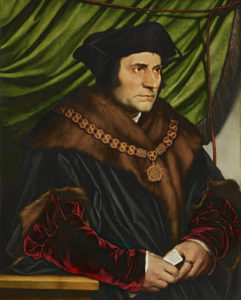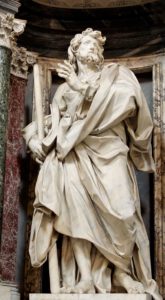Welcome to the opening matchup of Lent Madness 2020! If you're a veteran of the Saintly Smackdown, we're delighted you're back for another year of saintly thrills and spills. If you're joining us for the first time, we're especially glad you're along for this wild penitential ride. If you're curious about what this all entails, check out the About Lent Madness tab on the website.
year of saintly thrills and spills. If you're joining us for the first time, we're especially glad you're along for this wild penitential ride. If you're curious about what this all entails, check out the About Lent Madness tab on the website.
To experience the fullness of the Lent Madness experience, the Supreme Executive Committee (the somewhat benevolent dictatorship that runs this whole enterprise) encourages you to do several things. First, like Lent Madness on Facebook and/or follow us on Twitter. Second, subscribe to the Lent Madness e-mails so you never miss a vote -- you'll get each matchup hand-delivered to your inbox on the weekdays of Lent. You can do this by going to the home page of our website and entering your e-mail address (near the top right). Third, you can support the ministry of Lent Madness by heading over to the Lentorium and purchasing Lent Madness swag, thereby impressing everyone on your block. Or at least in your pew.
But mostly, we encourage you to read about the 32 saints participating in this year’s edition of Lent Madness, faithfully cast your (single!) vote on the weekdays of Lent, and add your comments to the great cloud of participating witnesses that gathers as the online Lent Madness community each year. If you're wondering when your favorite saint will be competing - in order to rally your friends and neighbors (creative campaigning is encouraged, voter fraud is not) - you can check out the 2020 Matchup Calendar.
Things kick off with an early 16th century Anglican facing off against a Biblical character as Thomas More clashes with James the Less. We hope you enjoy reading about these two saintly souls, more or less, before casting your very first vote of Lent Madness 2020! We're glad you're all here. Now get to it!
Thomas More
 Of all the characters of the English Reformation, few are as remarkable as Sir Thomas More. He was considered a scold yet also a man of quick wit, at once both politically astute and obstinate, and a man who was behind his time even as he lived ahead of it.
Of all the characters of the English Reformation, few are as remarkable as Sir Thomas More. He was considered a scold yet also a man of quick wit, at once both politically astute and obstinate, and a man who was behind his time even as he lived ahead of it.
Born in 1478, Thomas became a barrister in 1502 and was elected to Parliament in 1504. For a time, Thomas debated becoming a Franciscan or a priest — and ultimately chose neither, pursuing marriage and a legal career instead. While known for his strict piety, including the wearing of a hair shirt, and the daily recitation of the Offices, Thomas delighted in life in London and was eager to engage in argument and debate.
Thomas’s intellect, honesty, and loyalty to his family and king brought him into the service of Henry VIII. During this time, Thomas wrote Utopia, a political essay envisioning an ideal community in which there is no private property, universal religious toleration, and free education for men and women alike.
Thomas was a devoted husband and father, committed to the education of his wife and four daughters to a level far exceeding the standard education of women during that time; his dedication to this task was often noted by his contemporaries.
In 1529, Thomas became Lord Chancellor of England. Thomas was strident in his opposition to the Protestant Reformation, and his support in joining Henry VIII’s attack on Martin Luther earned him the title “defender of the faith” by the Pope. As Henry moved to assert his power as king over the Church in England, Thomas, dedicated to the Roman Church, found himself in opposition to the king he loved. He resigned as chancellor in 1532. When Thomas later refused to take an oath swearing that Henry’s marriage to Anne Boleyn was true and valid (after the divorce from Catharine of Aragon), he was thrown into the Tower of London. At trial, Thomas defended himself as being true to the church over any king. He was condemned to die and executed in 1535. His final words were that he died for the faith of the Church and was “the king’s good servant, but God’s first.”
Collect for Thomas More
Almighty God, by whose grace and power your holy martyr Thomas More triumphed over suffering and was faithful even to death: Grant us, who now remember him in thanksgiving, to be so faithful in our witness to you in this world, that we may receive with him the crown of life; through Jesus Christ our Lord, who lives and reigns with you and the Holy Spirit, one God, for ever and ever. Amen.
James the Less
 Who was James the Less? Well, it depends on whom you ask. This is because the gospels are replete with Jameses. There’s James the son of Zebedee, James the son of Alpheus, as well as James the brother of Jesus. The confusion is further compounded because the gospel writers don’t always distinguish which James they’re referring to in a passage and the Gospel of Mark only refers to “James the Less” in one passage (Mark 15:40).
Who was James the Less? Well, it depends on whom you ask. This is because the gospels are replete with Jameses. There’s James the son of Zebedee, James the son of Alpheus, as well as James the brother of Jesus. The confusion is further compounded because the gospel writers don’t always distinguish which James they’re referring to in a passage and the Gospel of Mark only refers to “James the Less” in one passage (Mark 15:40).
Some Roman Catholics believe James the Less refers to James the brother of Jesus, while Anglicans consider James the Less as James the son of Alpheus. Even if we blithely assume the Anglicans are right in saying that James the Less is, indeed, James the son of Alpheus, this biography almost comes to a full stop. The truth is, we know very little about this apostle. Yet perhaps what we know is important enough. James the son of Alpheus was most certainly an apostle as three of the gospels include him in their lists (Mark 3:18; Matthew 10:3; Luke 6:12-16) — and he is also present in a room that is full of apostles in Acts 1:13. Beyond this, however, there’s not much more to go on.
Of course, this has never stopped the wider church from filling in the gaps — as you’ll see, neither will it stop me. Some legends hold that James the son of Alpheaus lived to ninety-six years old and died by crucifixion at the hands of the Jewish authorities in Ostrakine in lower Egypt. His body was then sawed in half. This is dubious for many reasons, including the fact that crucifixion was a favorite execution method of Roman, rather than Jewish, authorities.
But since I’m already giving space to dubious claims, I want to offer a new one, entirely of my own creation, and equally bereft of any evidence. In Mexican Spanish, we add a diminutive to people we feel an incredible amount of affection for, to those we love and adore. Mexican Spanish contrasts with America’s obsession with “bigger is better” by linguistically shrinking everyone we love to make them cuter and sweeter and more adorable still. I’d love to believe that “the less” is, in fact, a diminutive rooted in affection. If so, then Mark 15:40 is talking about James the little guy, James the adorable apostle, James the cherished one. Which James, exactly, this passage refers to remains a mystery, but to my mind that’s still a James worth voting for.
Collect for James the Less
Almighty God, who gave to your apostle James grace and strength to bear witness to the truth: Grant that we, being mindful of his victory of faith, may glorify in life and death the Name of our Lord Jesus Christ; who lives and reigns with you and the Holy Spirit, one God, now and for ever. Amen.
[poll id="270"]
311 comments on “Thomas More vs. James the Less”
Hilary Mantel's letter to Thomas More: 'We have to lie about you a little in order to like you'
https://www.telegraph.co.uk/books/authors/hilary-mantels-letter-thomas-have-lie-little-order-like/
Little James for sure!
Thomas may have been for education for women, but he tortured and killed people who disagreed with him theologically and politically in his basement. James!
Reading the comments is only making my decision harder. :-O I wish Senor Escobar had given the Spanish for "lil' James" - Iagito? Diegito? I have a good and holy friend named James so for his sake it's more the Less for me.
Well, Boys, you have certainly started us off with a bang. A pun (the lowest form of humor) combined with folks who bring forth all kinds of serious theological and political implications, throw in gender equality, and add a brilliantly written biography about someone who is sort of someone, maybe. This is going to be quite a Lent!
It seems a bit odd to remember some someone who died committed to Rome as an Anglican, but I have to go with someone we have more historical knowledge about. Sorry St. James the Less!
A fave passage, "But of others there is no memory; they have perished as though they had never existed;...But these also were godly men." Whoever James was, Jesus thought he had worth. Not much of a narrative, I know.
Charmed by Miguel’s lovely suggestion, and as former vicar of St. James on Warwoman Road (which James remains a mystery, I believe), I went with him. But Sir Thomas had quite a pull on me, too, and with all his flaws, we know who he was. I read “Utopia” as a teenager and was most impressed. Looks like I’m down one right out of the gate.
I am thinking Moore is Less
Best saint you never knew...
I'm voting for James! Here's a poem I wrote about him:
Roses are red,
Violets are blue,
James the Less, you're super awesome,
And I'm definitely voting for you!
There were 3 Joannes in my family so in memory of my mother, little Joanne, I'm voting for James the Less
I'm for the little guy!
The nature of God is to bless
all people of true faithfulness.
While Thomas was sure
his actions were pure,
I'll stick with good ol' James the Less.
Thomas More was no saint. He deliberately took uneducated wives, and then decreed that all dinner time conversation must be in Latin, shutting them out. He had a private torture chamber in his house, where he oversaw the torment of select heretics; he also had an outdoor torture setup in his garden, for use in fine weather. When he could not persuade a heretic to return to Holy Mother Church, he always made a point of attending the burning. There are good reasons that he wasn't canonized for such a long time. He never deserved it it all.
Thomas More spoke truth to power. He gets my vote!
Finally, the opportunity to quote Professor Eric Mascall's wonderful poem from Pi in the High ------ "To a Church Dignitary Who Has Spoken Contemptuously of a Saint" Last line, "I could not love thee, Dean, so much loved I not Thomas More". This tiny book of poetry has been my joy since I first met it in the 1970's. My vote is for Thomas.
Love Migeul's thoughts about James the Less but ultimately voted for Thomas More.BTW, In addition to the play/movie Man for all Seasons, he also has a pop song! it was the B side to a top 40 hit in 1979
https://www.youtube.com/watch?v=lahaDgsW6ak
Cool find, Kate B! I never heard this. One boo-boo in it: He sings about Henry Plantagenet, but this is, of course, Henry Tudor we're talking about. Do you think he was confusing Thomas More with Thomas à Becket?
Yeah I just read about that mix up on his wikipedia page (when I was looking for the year the song came out). Good pick up!
As an ardent socialist, Thomas More has my sympathy, but I can't in good conscience vote for anyone as opposed as he to the protestant - especially the English - reformation.
Less is not Moore
Sant Iagito!
All the determined current adherents to RIGHTNESS are exhausting. I'm going with quiet faithfulness that was such that he was granted an honorable mention.
Less is More. I vote for James.
Any friend of Erasmus is a friend of mine.
As an American literature specialist who faced down Thomas More in many a literary incident, I'm voting for him.
I vote for Jimmy
James the Less, the Little, the Minor, the Lessor.
Less is best opening the early church to more, to ALL. Nay More!
His life of faith still inspires as we are called to continue this path together, to respond and listen to the struggles and joys of ALL peoples in a broken world.
So Less is more.
Why is James the Less even in this match? There is no mention of what he actually did! Are we scraping the bottom of the barrel for a saint to include?
After reading all of the comments so far, and feeling like someone mentioned in the Gospels was, like the other apostles, taking a giant leap of faith and actively following Jesus, I had to vote for St James the Less. However, I would like to know More about the Roman Catholic version of James the Less, as Jesus's brother?
James the Less, not More.
Please enroll me so I get the daily emails.
See the box where you are supposed to enter your email address, upper right hand corner of the home page, lentmadness.org